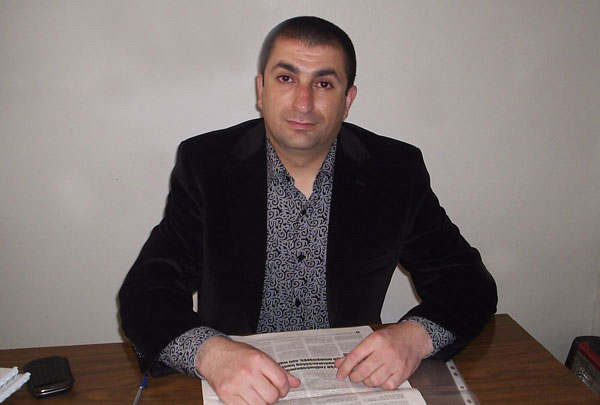In the conversation with Aravot.am, political scientist Gagik Hambaryan, commenting on Armenia’s voting against to the resolution on Ukraine in the UN General Assembly on March 27, with which our country does not recognize Ukraine’s territorial integrity and considers the Crimean referendum held on March 16 illegal, said, “We have no commitment to Ukraine, especially in moral terms, because Ukraine, initially since the declaration of its independence, was always openly conducting an anti-Armenian policy. I would suggest our, roughly speaking, pro-Western-oriented commentators to be more restrained and put aside the fact of being pro-Western and pro-Russian in this matter.
Let’s tell the truth what foreign policy was displayed in the last 22-23 years by Ukraine to Armenia, in particular. I do not want to list the details, just to remind starting from popular hired pilot killer Yuri Belichenko who was taken captive by Armenians after his plane was shot. He was the man who was dropping cluster bombs that were forbidden by the international laws over Stepanakert, Askeran and Martakert. And we should not forget what kind of military and strategic partnership was established between Azerbaijan and Ukraine. In the last 20 years, in 1993-2013, Ukraine has delivered an enormous amount of weapons and ammunition to Azerbaijan”. According to our interlocutor, Ukraine has always had an anti-Armenian position in the diplomatic sector. “Ukraine is one of active members of GUAM organization (Georgia-Ukraine-Azerbaijan-Moldova), which had always displayed an anti-Armenian position under all statements signed in this organization. Ukrainian MPs always had an anti-Armenian orientation in OSCE and Council of Europe Parliamentary Assembly and vote for anti-Armenian resolutions. And most importantly, on 14 March 2008, the UN General Assembly adopted the No. 62243 resolution proposed by Azerbaijan, which was openly anti-Armenian. Yesterday, the former Ambassador of Ukraine to Armenia Alexander Bozhko gave an interview to “Liberty” radio station, I do not want to point out that he deliberately fabricated the reality or lied, he is a human and might have forgotten, however, I consider it necessary to remind Mr. Bozhko that Georgia, Moldova, Ukraine and Serbia were next to 39 countries voting in favor to this statement. In fact, 5 out of 39 countries were Christian countries. Let’s put Uganda aside because there is an open caviar-oil diplomacy here, whereas Georgia, Moldova and Serbia had territorial problems with each other, which supposedly is similar to the Nagorno-Karabakh problem, therefore they had voted in favor of the document submitted by Azerbaijan. I am surprised at the Ukrainian version. Why Ukraine? It had never had territorial problems before and it did not have bad relationship with Armenia before this issue of Crimea emerges. Yesterday, Alexander Bozhko was assuring that strategic partner Russia had also voted in favor of the document submitted by Azerbaijan is a lie, there is no such a thing. Russia, France, and the United States, the OSCE Minsk Group member-states did not vote in favor or abstained, moreover, they were openly against it. Seven countries voted against the resolution: Angola, Armenia, India, Russia, the U.S. and France. In other words, the three co-chairs of the OSCE Minsk Group, which at the same time are the UN Security Council members, all 3 of them voted against the resolution. I would suggest the Armenian commentators not to rejoice that much that in case of Crimea, Armenia along with Somali has also voted in favor. So what? The same Somali was voting next to Azerbaijan, the same Comoros islands – lost and confused, the same Tuvalu named state, which you cannot even find it on the map. So, we should not speak ironically of Armenia’s voting in favor of, yes, this was an adequate response to Ukraine for its anti-Armenian stance until now. Our Foreign Affairs Ministry has always been very weak in this regard. Well, if we had also sent notes to Ukrainian Foreign Ministry in 2008, and had called their ambassador and demanded to provide explanation of what are the motives of Ukraine to sign under the anti-Armenian resolutions, when we also, roughly speaking, would fall into the hysteria and call our ambassador back to Yerevan, and be in a rage, it would be much better.
Why Ukraine is not falling into rage with regard to other states, specifically, Kazakhstan, I have not noticed such a thing. Or, who is the presidential candidate for Ukraine Tyahnybok to demand from us to give an answer of why we had voted against? We considered it correct and voted.” According to the political scientist, Armenia should formally announce that the case of Crimea is very similar to Nagorno Karabakh problem, since if Nagorno-Karabakh was annexed to Azerbaijan in 1921 by the desire of Stalin, the same for Crimea in 1954, with a signature of one person, by the desire of Ukrainian ethnic Khrushchev, Crimea was annexed to Ukraine, isolating it from Russia. “Like in Karabakh, the Azerbaijanis were doing everything to assimilate Armenians and reduce their number. In 1921, 95 percent of population was Armenians, in 1988 this number was 75 per cent, they had already reached the point of reducing by 20 percent, the same was conducted in Crimea by Ukrainian authorities. They were repeatedly saying that Crimean Tatars were exiled, also Crimean Armenians, also Greeks, the Jews, and also a large number of Russians. Why did only Tatars suffer? Tatars make up 12 percent of the population in Crimea, and they are the 3rd ethnic group over there, and Russians constituting more than 60% of the population have the right to express their opinions on where they want to live, especially when the Crimea’s annexation to Ukraine occurred by the desire of one person,” says the political scientist.
Nune AREVSHATYAN




















































